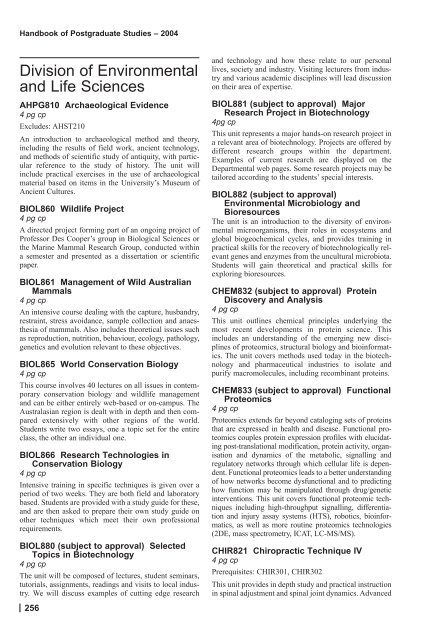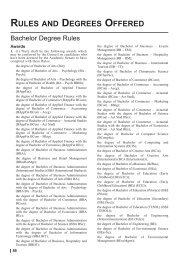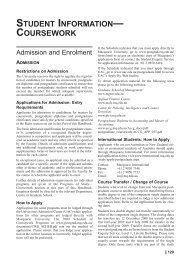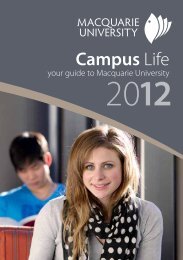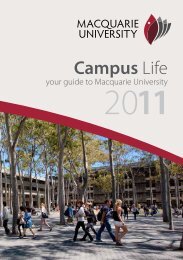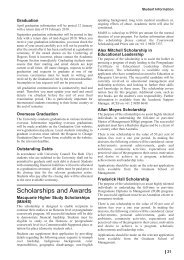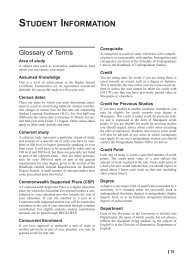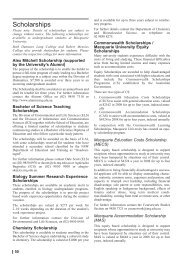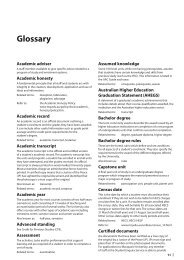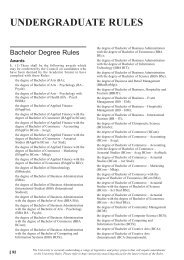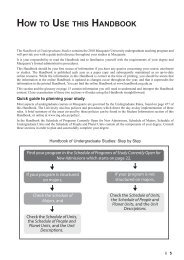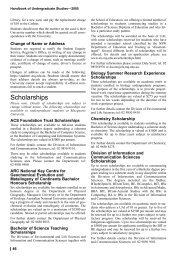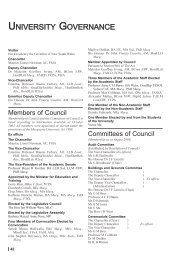Print PG 1-lots - Macquarie University Handbooks
Print PG 1-lots - Macquarie University Handbooks
Print PG 1-lots - Macquarie University Handbooks
You also want an ePaper? Increase the reach of your titles
YUMPU automatically turns print PDFs into web optimized ePapers that Google loves.
Handbook of Postgraduate Studies – 2004Division of Environmentaland Life SciencesAH<strong>PG</strong>810 Archaeological Evidence4 pg cpExcludes: AHST210An introduction to archaeological method and theory,including the results of field work, ancient technology,and methods of scientific study of antiquity, with particularreference to the study of history. The unit willinclude practical exercises in the use of archaeologicalmaterial based on items in the <strong>University</strong>’s Museum ofAncient Cultures.BIOL860 Wildlife Project4 pg cpA directed project forming part of an ongoing project ofProfessor Des Cooper’s group in Biological Sciences orthe Marine Mammal Research Group, conducted withina semester and presented as a dissertation or scientificpaper.BIOL861 Management of Wild AustralianMammals4 pg cpAn intensive course dealing with the capture, husbandry,restraint, stress avoidance, sample collection and anaesthesiaof mammals. Also includes theoretical issues suchas reproduction, nutrition, behaviour, ecology, pathology,genetics and evolution relevant to these objectives.BIOL865 World Conservation Biology4 pg cpThis course involves 40 lectures on all issues in contemporaryconservation biology and wildlife managementand can be either entirely web-based or on-campus. TheAustralasian region is dealt with in depth and then comparedextensively with other regions of the world.Students write two essays, one a topic set for the entireclass, the other an individual one.BIOL866 Research Technologies inConservation Biology4 pg cpIntensive training in specific techniques is given over aperiod of two weeks. They are both field and laboratorybased. Students are provided with a study guide for these,and are then asked to prepare their own study guide onother techniques which meet their own professionalrequirements.BIOL880 (subject to approval) SelectedTopics in Biotechnology4 pg cpThe unit will be composed of lectures, student seminars,tutorials, assignments, readings and visits to local industry.We will discuss examples of cutting edge researchand technology and how these relate to our personallives, society and industry. Visiting lecturers from industryand various academic disciplines will lead discussionon their area of expertise.BIOL881 (subject to approval) MajorResearch Project in Biotechnology4pg cpThis unit represents a major hands-on research project ina relevant area of biotechnology. Projects are offered bydifferent research groups within the department.Examples of current research are displayed on theDepartmental web pages. Some research projects may betailored according to the students’ special interests.BIOL882 (subject to approval)Environmental Microbiology andBioresourcesThe unit is an introduction to the diversity of environmentalmicroorganisms, their roles in ecosystems andglobal biogeochemical cycles, and provides training inpractical skills for the recovery of biotechnologically relevantgenes and enzymes from the uncultural microbiota.Students will gain theoretical and practical skills forexploring bioresources.CHEM832 (subject to approval) ProteinDiscovery and Analysis4 pg cpThis unit outlines chemical principles underlying themost recent developments in protein science. Thisincludes an understanding of the emerging new disciplinesof proteomics, structural biology and bioinformatics.The unit covers methods used today in the biotechnologyand pharmaceutical industries to isolate andpurify macromolecules, including recombinant proteins.CHEM833 (subject to approval) FunctionalProteomics4 pg cpProteomics extends far beyond cataloging sets of proteinsthat are expressed in health and disease. Functional proteomicscouples protein expression profiles with elucidatingpost-translational modification, protein activity, organisationand dynamics of the metabolic, signalling andregulatory networks through which cellular life is dependent.Functional proteomics leads to a better understandingof how networks become dysfunctional and to predictinghow function may be manipulated through drug/geneticinterventions. This unit covers functional proteomic techniquesincluding high-throughput signalling, differentiationand injury assay systems (HTS), robotics, bioinformatics,as well as more routine proteomics technologies(2DE, mass spectrometry, ICAT, LC-MS/MS).CHIR821 Chiropractic Technique IV4 pg cpPrerequisites: CHIR301, CHIR302This unit provides in depth study and practical instructionin spinal adjustment and spinal joint dynamics. Advanced256


